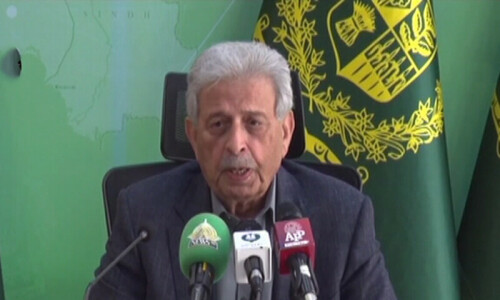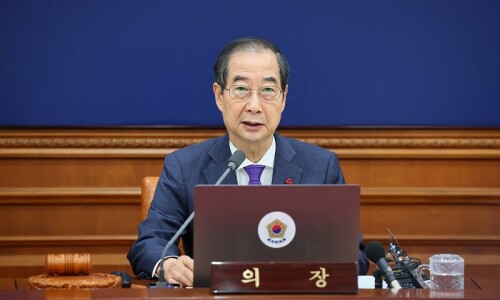ISLAMABAD, July 22 The Supreme Court took an unprecedented step in the country's judicial history on Wednesday by inviting a former military ruler to defend his extra-constitutional actions in the court.
A notice issued by a 14-judge bench hearing a case relating to two judges of the Sindh High Court asked Gen (retd) Pervez Musharraf to defend his proclamation of emergency and replacing the Constitution with a provisional constitution order on Nov 3, 2007.
However, Chief Justice Iftikhar Mohammad Chaudhry made it abundantly clear that the former dictator was not being summoned and it was up to him to defend himself, either by appearing in person or through a lawyer.
The notice was issued after a lot of deliberation during which three of the counsel contended there was no need to call the retired general, but the chief justice and some other judges were of the view that instead of letting the case go against him by default, the general should be given an opportunity to appear or defend his actions through a legal representative.
Three days of proceedings on a petition filed by the Sindh High Court Bar Association against non-confirmation of two SHC judges — Justice Zafar Ahmed Khan Sherwani and Justice Abdul Rasheed Kalwar — evoked apex court's interest in looking into the entire gambit of issues, from revisiting the Tikka Iqbal Mohammad case of validating the Nov 3 emergency to deciding the fate of PCO judges to the amendments made to the Constitution by inserting Article 270AAA and other effects of actions taken during the emergency.
The notice was issued after Attorney General Sardar Mohammad Latif Khan Khosa refused to defend Gen (retd) Musharraf, who had on Nov 3 sent home 60 superior court judges, including three chief justices.
“I have not received instructions from the government to defend the actions of Nov 3,” the attorney general said, adding that the PPP government had always opposed dictatorial/repressive regimes and anti-people forces getting into the corridors of power through backdoor.
“In terms of Rule 9 of Order XXV of the Supreme Court Rules 1980, let a notice of the instant proceedings be issued to Gen (retd) Pervez Musharraf at his residential address (Chak Shahzad) in Islamabad, leaving to him to appear before the court or otherwise,” the court order said.
Legal experts who expect a judgment that may change the course of democratic order in the country are surprised by what they say lack of interest shown by politicians in the case. They point out that no politician of stature has so far attended the exciting proceeding over the past three days.
Soon after the postponement of hearing for next Wednesday, former attorney general Malik Mohammad Qayyum, who had defended Gen (retd) Musharraf's actions in the Tikka Iqbal Mohammad case, offered to represent Musharraf in the court, saying he would consider becoming his counsel if approached by the general.
However, he told journalists outside the court that as attorney general he was only responsible for the actions of the government and Gen Musharraf, according to him, had proclaimed the emergency in his capacity as the army chief.
The larger bench also noted that both print and electronic media had been publicising widely the court's observations and proceedings for the past two or three days, but merely on such presumption the principle of allowing opportunity of hearing could not be presumed to have been complied with.
“It is a cardinal principle of natural justice of universal application that no one should be condemned unheard, also recognised by this court in almost every judgment where an adverse decision is likely to come,” Chief Justice Iftikhar Chaudhry observed.
Referring to the cases of Malik Feroze Khan Noon, Fauji Foundation and Amanullah Khan, the order said that superior courts stayed their hands off and did not allow the benefit to the opponents of the observations made against a person who was not a party to the proceedings before the court in those cases.
No doubt, the order said, in the Asma Jillani case notice was not issued but the fact remained that the respondent government in that case had not made any categorical statement not to defend the actions of the respondent general.













































